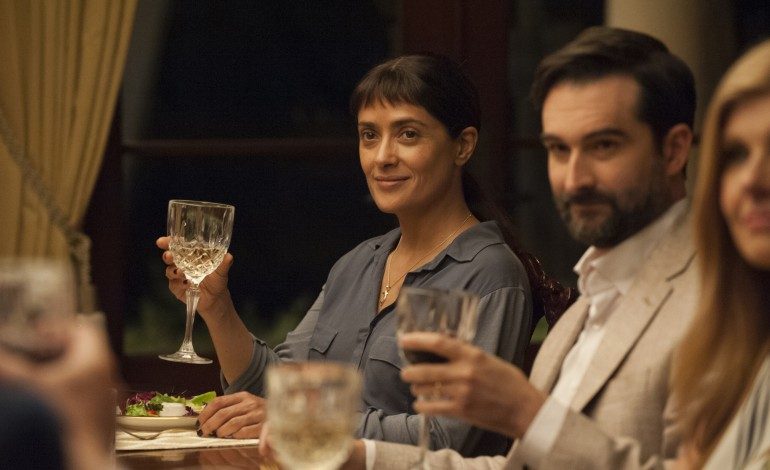

In previous collaborations, director Miguel Arteta and writer Mike White have artfully explored characters quietly in the throes of imbalance and alienation. Their latest feature – Beatriz at Dinner – is one of a kind with their previous works Chuck & Buck (2000) and The Good Girl (2002) in gently, but provocatively exploring the darker aspects of the human condition through the lens of tenderly observed character studies. These expressions are forged with humor – often intentionally awkward, uncomfortable and somewhat dangerous – but veiled in tragedy; similar tones are also evident in White’s underrated directorial debut Year of the Dog (2007) and throughout his HBO comedy series Enlightened (2011-2013).
The difference is Beatriz at Dinner, at least on the surface, feels utterly of the moment and admittedly a bit Trumpian. The set-up is simple: Beatriz (Salma Hayek), a massage therapist and holistic healer, finds herself invited to a posh dinner party being held by Cathy (Connie Britton), one of her well-meaning, upscale clients. It’s a business dinner where Cathy’s husband Grant (David Warshofsky) hopes to sway favor with a moneybags real estate blowhard named Doug Strutt (John Lithgow); other guests include plutocrats played by Chloë Sevigny, Jay Duplass and Amy Landecker. The dinner does not go well.
It’s teased early on, notably as Beatriz opines that she knows Doug. But where? Could he be the tacky real estate developer who drove her former Mexican village to shambles and protest over the construction of a luxury hotel? Or could it be that she knows him merely from his blue-collar transgressions and various scandals that have regularly made headlines? The squirm-inducing evening, availed by the free-flowing of alcohol, proceeds at a click, with humor underlining suspense. Yet, Arteta and White aren’t interested in following an easy track.
As constructs, a woman like Beatriz – presented as a modest, but faithful woman of morality and seeming good judgement – and a man like Doug – presented, well, quite similarly to the current occupier of the White House – are caricatures of differing, alternative values. For instance, when Doug meets Beatriz, he mistakes her for the help and later in the evening questions whether or not she came to America legally. Beatriz, by contrast, with Buddhist elan greets these strangers with hugs. In the most basest of terms, Beatriz at Dinner serves as a ticking time bomb, teasing and seething for the moment until the two of them finally go to blows with one another. It does and they do, but through White’s sly and deceptively simple script, Beatriz at Dinner grows ever more thoughtful, surprising and enigmatic along the way.
Most striking is in the interplay between Beatriz and Doug on this unfortunate evening reveals that both, perhaps, may be two sides of the same coin. Beatriz’s sheen of benevolence – she caters to cancer patients, dogs and goats, after all – proves more and more of a mask as the movie, in all its unsettling armor, moves forward just as Doug proves a slightly rationale, if not totally reasonable beacon of capitalism. While Beatriz is quiet, coiled and still, Doug is flashy, flamboyant and forward. What seems to freak both of them out is that she sees right through him and he’s clearly grown accustomed to most, not excluding his friends and family, not bothering to pay such close attention. Lithgow, in a lithe and skillful performance, delivers sharply as the fireworks spark.
Yet it’s Hayek who serves the film with her brittle, but laser-focused portrayal of Beatriz, one of the best of her career. The surprise, of sorts, in Beatriz at Dinner is that Arteta and White are actually far more attuned to the mysteries and ticks of Beatriz and, on the outset, less invested in the class warfare that spikes the movie and lends it a certain topicality. The dinner party, if nothing else, proves just a conduit to the unleashing of pain that Beatriz appears to have repressed for some time; she’s not so much a woman on the verge of breakdown but one well within one. She just never had the time to become aware of it. Hayek plays her like a lost Cassavettes heroine swirling around a shallow hall of privilege.
More precisely though, Beatriz is a woman of uniquely White-ian properties. Akin to Justine (Jennifer Aniston) in The Good Girl, Peggy (Molly Shannon) in Year of the Dog or Amy (Laura Dern) in Enlightened, Beatriz proves complicated, enigmatic and driven to previously unforeseen agency once jolted from her comfort zone. The four of them should host a dinner party.
Verdict: 4 out of 5
Tightly written by Mike White and elegantly framed by Miguel Arteta, Beatriz at Dinner, while modest and intimately scaled, offers a dark yet humorous thesis on race and class. What ultimately differentiates this intentionally awkward morality tale is a humanely observed thoughtfulness in character and a sublimely and subtly calibrated lead turn by Salma Hayek, who delivers one of the strongest performances of her career.



